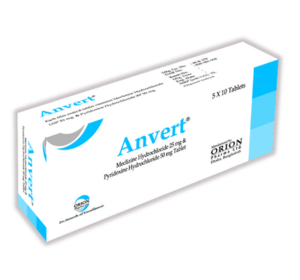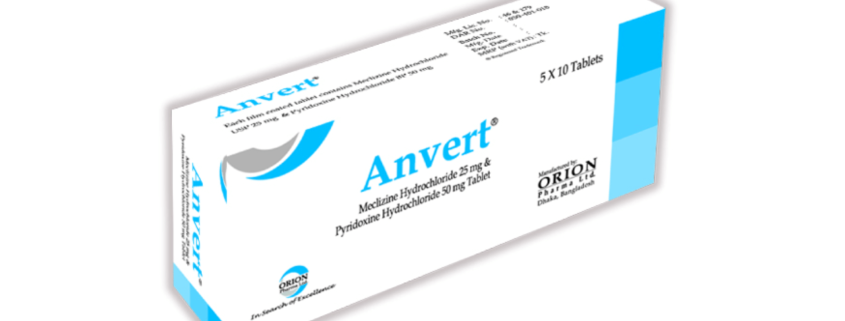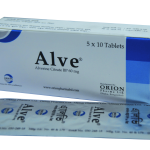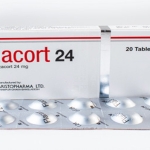Anvert

ANTI EMETICS: Meclizine & Pyridoxine
Indication
For prophylaxis and symptomatic relief of nausea, vomiting, dizziness, motion sickness, radiation sickness, vertigo associated with diseases of vestibular system (e.g. Meniere\’s syndrome, labyrinthitis and other vestibular disturbances) and morning sickness during pregnancy.
Contraindication
The fixed-dose combination is contraindicated in individuals who have shown a previous hypersensitivity to these ingredients.
Dosage & Administration
Nausea & vomiting (including morning sickness in pregnancy): 1 tablet 1-2 times daily or as directed by physician.
Motion sickness: The initial dose is 1-2 tablets daily; it should be taken one hour prior to journey for protection against motion sickness. Therefore, the dose may be repeated every 24 hours as indicated for the duration of journey.
Vertigo: 1 tablet 2 times daily or as directed by physician.
Labyrinthine and vestibular disturbances: The optimal dose of Meclizine Hydrochloride is usually 25 to 100 mg daily in divided doses, depending on the clinical response.
Radiation sickness: 50 mg Meclizine Hydrochloride administered 2-12 hours prior to radiation treatment. Pyridoxine Hydrochloride has been shown to be safe and effective in dosages of 50 to 200 mg per day.
Side Effect
Drowsiness, dry mouth, urinary retention on rare occasions, blurred vision have been reported.
Precaution
Due to its potential anticholinergic action, patient with asthma, bronchitis, emphysema, enlarged prostate, glaucoma or urinary tract blockage should take Meclizine Hydrochloride (like other antiemetics) with caution.
Pregnancy and Lactation
Meclizine Hydrochloride: Pregnancy category B. Large-scale human studies have not demonstrated adverse fetal effects. It is the drug of first choice in treating nausea and vomiting during pregnancy.
Pyridoxine Hydrochloride: Pregnancy category A. Pyridoxine Hydrochloride itself is considered safe during pregnancy and has been used in pregnant women without any evidence of fetal harm. Nursing Mothers: Although Meclizine Hydrochloride may excrete into the milk, it causes no harm in nursing babies.
Drug Interaction
Meclzine Hydrochloride: The CNS depressant effects of Meclizine Hydrochloride can be potentiated by concurrent use of CNS depressant agents such as benzodiazepines, barbiturates, tricyclic antidepressant, opiate agonists, skeletal muscle relaxants, antihistamines, alochol and tranquilizer. Meclizine Hydrochloride can increase the absorption of digoxin by decreasing gastrointestinal motility. Monoamine Oxidase inhibitors may prolonged and intensify the anticholinergic effects of Meclizine Hydrochloride.
Pyridoxine Hydrochloride: Pyridoxine reduces therapeutic effect of Levodopa.
Presentation
Each commercial pack contains 5 x 10 film coated tablets in blister strips.



